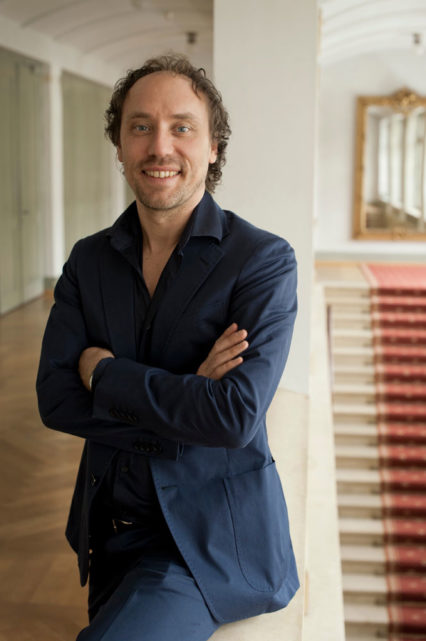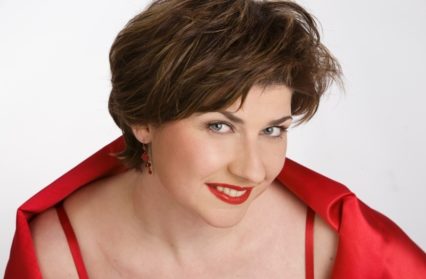Nigel Jarrett reviews a concert from the BBC National Orchestra of Wales at St. David’s Hall, featuring works of Mozart, Strauss and Brahms conducted by Otto Tausk.
One’s autumn of life in the 19th century was not always late in the day. But Brahms had eight years to live after reaching a summit with his fourth – and last – symphony at 56, and Richard Strauss was in his eighties when he wrote his sublime farewell to life and love in the Four Last Songs. ‘Finality’ in the case of Brahms’s Fourth has only the merest hint of regret. For many it represents the composer at the top of his game: resourceful, confident and tightly controlling of his material, especially in the astonishing final movement, (allegro energico e passionato – no translation needed), a set of 32 variations on a chaconne and erected on a ground bass influenced by one from J. S. Bach’s Mass in B minor. This recall of older forms, some pre-Classical and including folk song and dance, was creative, not routine or lazy. Inevitably, perhaps, the look over the shoulder is that of a man who has found fame if not lasting love; but he seems to deal with sentiment at the start in a quick, but not too quick, opening movement. No lingering elegy here.

The Dutch conductor Otto Tausk, who last appeared with the BBC NOW five months ago in a concert of tone poems and is music director-designate of the Vancouver Symphony Orchestra, took charge of this programme. His was a lively presence; he steamed through the overture to Mozart’s The Marriage of Figaro at a lick before the Strauss work, though there were historic connections to establish here in terms of music theatre and singing if no points to make about the themes of the opera, which do not appear in its nippy prelude.
Tausk’s handling of the symphony, though, came with a few mixed blessings. He glossed slightly over the balladic character of the first movement, with its wispy regret deepening momentarily to lament, in order to get at the reconciliation which is its energetic and eruptive climax. The second movement was beautifully done, both as a meditative respite from the first’s ultimately epic and cataclysmic tone, and as a journey moving inexorably to the C major openness which marks the start and the end of the march-like third movement, notable for its piccolo and triangle parts.
Sadly, but probably redeemed for iPlayer re-telling, percussionist Mark Walker’s triangle part sounded submerged; perhaps it was his position on the platform that did for it. (Once asked what this movement was about, Brahms replied that it was ‘Alexander the Great’s march to India’ – which just goes to show (a) how important it is for the instrument to tinkle, in the sense of making a light, clear, ringing sound; and (b) how far apart are composers and those who try to explain their work.) What this reviewer failed to get was the foreboding that swirls beneath the martial light-heartedness of step, not so light in parts. The final movement needed more attention to the ingenuity with which Brahms disguises that unvarying cantus firmus. But, as a celebration of how the composer excelled himself in writing variations, at which he was no slouch, it was joyous and physical, if somewhat lacking in differentiation and subtlety.
Tausk and the orchestra – incidentally, fielding four guest principals – wound its magical course through Strauss’s Four Last Songs, undeterred by the way Polish soprano Aga Mikolaj appeared to waver between which voice to adopt: a more lightly coloured and plaintive one associated with Mozartian singing and her one-time teacher Elisabeth Schwarzkopf (particularly in this work), or one associated with the heavy brigade of Verdi and Wagner, and Strauss himself in moods not pre-figuring death, to which her voice has now become engaged. That said, her poise and technique applied to negotiating a compromise brought to the work a strength of character equally in keeping with its advance towards the blue yonder. If not actually poignant, it was honestly delivered. When everything’s said and sung, we all have to tread the path, and we’re all different. Good on her.
Nice violin solo by the orchestra’s leader, Nick Whiting, and a valedictory one by principal horn Neil Shewan, duly acknowledged with others elsewhere. In an appropriate encore, Tausk recalled Strauss by choosing one of the interludes from the composer’s opera Intermezzo.
This concert featuring Mozart, Strauss and Brahms can be heard on iPlayer for thirty days after this performance. The programme was also given at the Brangwyn Hall, Swansea, on April 19.
Header photo of Aga Mikolaj credit Wernicke
Nigel Jarrett is a winner of the Rhys Davies prize for short fiction and, in 2016, the inaugural Templar Shorts award. He’s a former daily-newspaperman and a regular contributor to the Wales Arts Review, Jazz Journal and Acumen poetry magazine, among others. He is also a poet and novelist. His latest story collection, Who Killed Emil Kreisler?, was published in 2016, as was his first novel, Slowly Burning. This year sees the publication of his short fiction pamphlet, A Gloucester Trilogy.
You might also like…
Nigel Jarrett catches Swansea City Opera on tour with a lively production of a now-controversial Mozart opera, Cosi fan tutte, which has been transplanted to 19th century India.



 Enjoyed this article? Support our writers directly by buying them a coffee and clicking this link.
Enjoyed this article? Support our writers directly by buying them a coffee and clicking this link.







